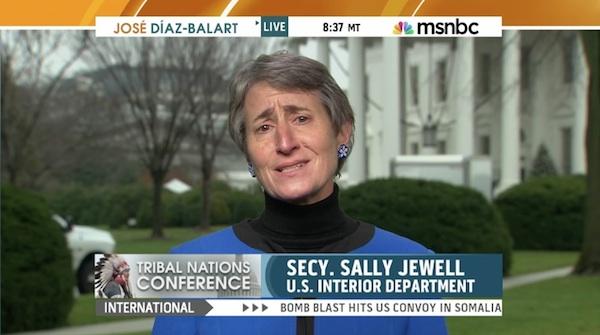
U.S. Secretary of the Interior Sally Jewell tells MSNBC host José Díaz-Balart, ‘They know their lands better than we do’ when asked about the Keystone XL pipeline.
By: Indian Country Today
U.S. Secretary of the Interior Sally Jewell invoked not only tribal sovereignty but also environmental expertise when she spoke to MSNBC’s José Díaz-Balart about the Keystone XL pipeline, which many tribes oppose.
“I think the fact that the tribal nations are standing up saying, ‘We are concerned about this. We are concerned about water quality. We’re concerned about tribal sovereignty. We’re concerned about what this pipeline may do for our lands and our rights,’ needs to be heard,” she said when he asked her to put tribal opposition to Keystone in context.
“In my role as secretary of the interior we will make sure that there’s a platform for those tribal voices to be heard,” she said. “And I think they will make a very effective case because they know their lands better than we do.”
In the end it will all come down to the State Department, she said, which will make the pipeline decision “by listening to all of the facts and information they have,” including tribal voices.
Jewell also spoke about Native youth, the centuries of oppression that have led to the current state of affairs regarding mental health, education and poverty, and on how it is time to make things right.
“We have destroyed much of the hope and the pride and the future for a lot of Native youth,” she said. “This is the time to turn that around.”
Her full chat with Díaz-Balart can be seen at MSNBC.com.
The pipeline threatens many tribal lands, especially Sioux territory in South Dakota, given that the proposed route traverses the Rosebud Sioux Reservation. Last month tribal President Cyril Scott said that if the pipeline passes it would be considered “an act of war,” and promised to fight it all the way.
RELATED: Rosebud Sioux Tribe Calls House Keystone XL Passage an ‘Act of War,’ Vows Legal Action
Rosebud Leader on Keystone: ‘Test Us—You’ll See an Indian Uprising’
Read more at http://indiancountrytodaymedianetwork.com/2014/12/04/they-know-their-lands-better-we-do-sally-jewell-keystone-xl-opposition-158132
